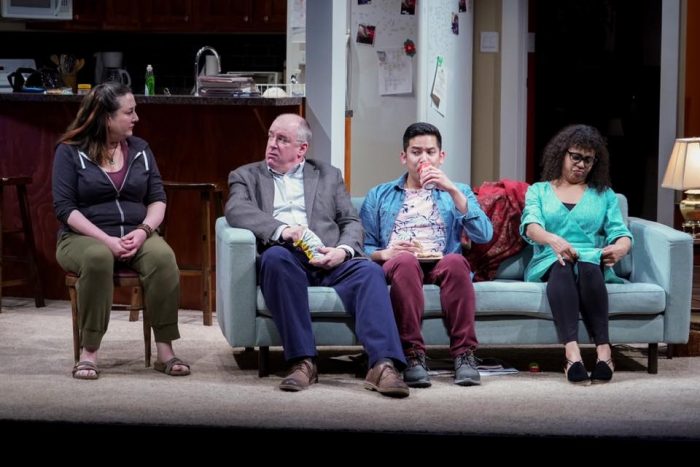
It’s a timely subject tackled by acclaimed playwright Dominque Morisseau in her 2017 play PIPELINE now onstage at the Green Lake Bathhouse Theater and produced by Seattle Public Theater. The play was inspired by Michelle Alexander’s book The New Jim Crow, which centers on the alarming numbers of young Black men in mass incarceration in the United States and how that process begins in the public school system where those young men are set up to fail and thus enter the “pipeline” that leads them to prison. Like the racist, segregationist laws of the late 19th century and up through the mid 20th century, this “pipeline” is, in effect, as damaging to contemporary young Black men as those restrictive laws of the past.
Morisseau, one of the most prominent and promising new theater writers working today, has already won accolades and acclaim for her other work, including scoring a Tony Award nomination for the book of the musical, Ain’t Too Proud: The Life and Times of The Temptations and her Detroit cycle of three plays including Skeleton Crew which has been produced to great acclaim at Seattle’s Arts West Theater in 2018 and is currently being produced on Broadway with Phylicia Rashad.
Pipeline was written and produced after Skeleton Crew but of the two works, Skeleton Crew is richer, fuller and more rewarding as a piece of gripping and well thought out theater centering on the lives of a group of workers at a Detroit industrial plant that is going out of business, largely due to the central character of Faye, the older worker on the crew. Pipeline also centers on a strong, female character, in this case it’s Nya, a pushing 40 teacher in an inner city school who is the mother of a teenaged boy who seems to be getting sucked into the “school to prison” pipeline despite the efforts of his family to prevent it.
Nya is a fascinating character; Morisseau is a gifted writer at creating strong, compelling female protagonists that are intelligent, fierce but flawed human beings and Nya is no exception. She’s a smart and compassionate lady but she’s frustrated dealing with her son’s situation as well as the overall issues she faces working in the public school system and trying to help other kids navigate its dangers. While she’s coping with her son’s woes, Nya is also dealing with her own worries including loneliness after her divorce from her son’s father and she’s increasingly turning to alcohol to help her cope with her life.
And, Nya’s story is also obviously entwined with that of her son, Omari who is a student in an upstate private school who has landed in some trouble…during an altercation with a bullying teacher, Omari shoved the teacher which was captured on video phone. It’s not the first time Omari has had anger management issues and there’s concern the teacher and the school could press charges. It’s also frustrating for Omari when he feels his parents aren’t hearing what he is saying about the pressures he’s under which leads to confronations with his mother, as well as his father, Xavier. Only his girlfriend Jasmine seems to have an understanding of what it’s like to be under that kind of pressure.
Nya is also haunted by the fear that something horrible is going to happen to her son. Morisseau uses Gwendolyn Brooks’ poem “We Real Cool” to great effect here, using the short poem throughout the play as a spectral threat of what Omari’s fate could be…the jazzy, jaunty poem ends with the words “we die soon” and those words not only haunt Nya but they seem to taunt Omari himself.
There’s also another plot thread centered on the inner city school where Nya works that features Laurie, an older white female teacher at the school also frustrated by an educational system that seems to be failing its students, and Dun, a security guard at the school that seems to have a mutual attraction with the lonely Nya.
It’s a solid story with complex characters and situations but one of the problems with Pipeline is the fact it feels like the play is just scratching at the surface of this story. It’s about an hour and a half long or so but there seems to be important elements left out…we need to see more and learn more about Omari’s other anger management issues; the incident focused on in the play is his “third strike”. What happened in those other instances? Was he provoked in those cases as well? And, some characters and relationships are underdeveloped here. I’d like to see and learn more about Jasmine and what it’s like for her as a Black female student in this mostly white private school; she hints at some of her troubles in one of her monologues but I’d like to learn more about her and her life.
There’s also the plot of what is going on in Nya’s inner city school and reference to a pair of male students that frequently seem to get into fights with each other…what is THEIR story? How and why are they getting pulled into this “pipeline”?
The father, Xavier, is also underdeveloped…we don’t know too much about him other than the fact he seems to be a successful businessman of some kind who takes pride in paying his child support on time and giving Omari a better life but not very compelled to give Omari any actual time in his life.
I think the main problem with Pipeline is the fact it really doesn’t seem much like a play but it feels more like a draft for what could be a terrific film about these same issues and characters. Film allows the use of rapid cuts and montage to build complex layered stories and this story as created by Ms Morisseau feels more cinematic than theatical. I’m not saying it can’t be a play, too, but I think it’s a play that needs to breathe more and tell MORE story! So many plays and playwrights today seem to be stymied by the modern take that all new theater pieces need to be one act and under 100 minutes or so. This is fine if the material fits into that specific format but some stories need to break FREE from those restrictions. Or, perhaps, be in a different format altogether.
With all that said, I still like this play. And, I like this production. It’s handsomely designed and well acted by the ensemble with fine work from Dedra D. Woods as Nya and especially from young Tre Scott as Omari, a powerful young actor with searing intensity as well as great charm and warmth. His dramatic showdown scene with his father was evocative and memorable.
I wasn’t crazy by all the staging choices made by Faith Bennett Russell; there are some awkward and stagey physical movements going on at times that deflected away from the powerful words being spoken. I did like most of the many scene transitions; Ahren Buhmann’s lighting and projections and Evan Mosher’s sound choices were both very well done and eased each switch from location to location.
It’s a mostly positive “yes” for Pipeline…it’s not Ms Morisseau’s best work but it’s a work that can and hopefully will live on in other and more fleshed out formats. There’s some beautiful imagery here and a powerful story. And it’s a winning piece of work from Seattle Public Theater centered on this strong troupe of actors and theater makers.


















